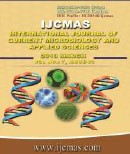


 National Academy of Agricultural Sciences (NAAS)
National Academy of Agricultural Sciences (NAAS)

|
PRINT ISSN : 2319-7692
Online ISSN : 2319-7706 Issues : 12 per year Publisher : Excellent Publishers Email : editorijcmas@gmail.com / submit@ijcmas.com Editor-in-chief: Dr.M.Prakash Index Copernicus ICV 2018: 95.39 NAAS RATING 2020: 5.38 |
Medicinal plants are a significant part of medicine systems due to pharmaceutically important secondary metabolites produced. Wild collection is the source to fulfil the increasing demand of these compounds which make plant species vulnerable. So, conservation of species is very essential along with the harvesting of medicinal plants. Here, root cultures of medicinal plants under in vitro condition may provide a source of secondary metabolite without affecting the natural population. The root cultures accompanied with the agroinfection with Agrobacterium rhizogenes may provide a cost effective way to produce roots for secondary metabolite production. A. paniculata is a source of andrographolide which have several medicinal properties. This research targeted towards the development of a conservative process for commercial production of andrographolide with the development of hairy root cultures in large scale and elicitation of andrographolide along with the isolation of pure andrographolide from hairy root cultures. The results of the work included highest 62.83+1.69% hairy root induction percentage in 10.2 induction days when apical meristem co-cultivated with Agrobacterium rhizogenes (MTCC 532) in half strength MS supplemented with acetosyringone 400μM. The best media for mass multiplication was found to be semi solid media with 40.8 fold increase in total biomass yield (fresh weight) after six weeks of culturing. Among different elicitation treatments given, highest andrographolide content (4695.9 µg/gm DW) with 3.0 fold increase compared to control was obtained when hairy root cultures were exposed to 500C temperature for one hour. This technique will give biomass yield of 6.81 gm/L (dry weight) which will produce 32000 μg/6.81 gm DW andrographolide. The isolation of pure andrographolide crystals from hairy root cultures have been done which can be used further for screening and utilization in pharmaceutical industries after screening in animal models.
 |
 |
 |
 |
 |